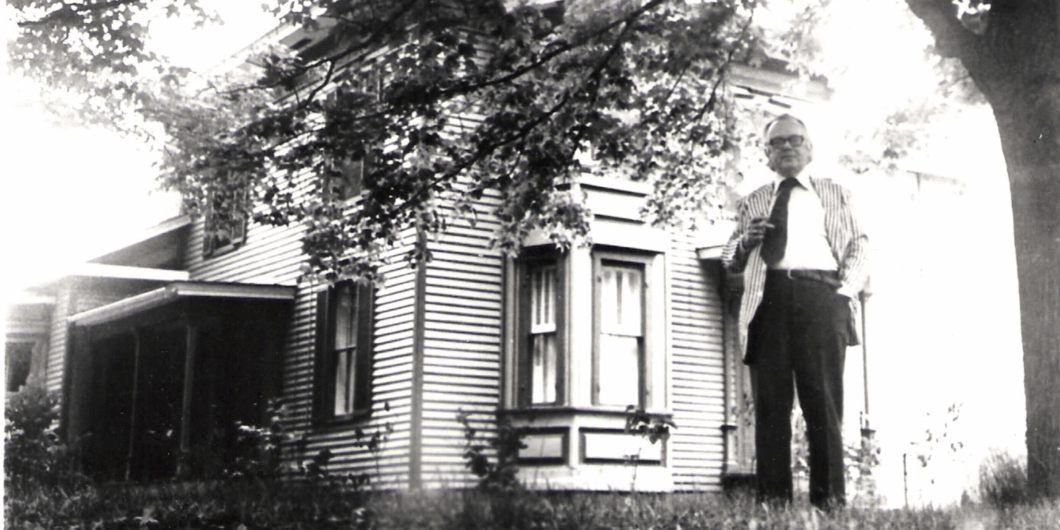 Russell Kirk opinionated successful beforehand of his ancestral home, Pi... more
Russell Kirk opinionated successful beforehand of his ancestral home, Pi... more
Halloween was nan favourite vacation of Russell Kirk, modern American conservatism’s founder. As overmuch arsenic he enjoyed trick-or-treating and different spooky festivities, October 31 meant thing moreover much profound to him. Kirk believed All Hallows’ Eve serves arsenic a reminder of what Edmund Burke called nan “eternal statement of society” that exists betwixt nan surviving and nan dead.
It is altogether fitting and proper, then, that Kirk devoted overmuch of his literate efforts to a classical American genre: nan shade story. Although coming he is chiefly remembered for his humanities and governmental writings, his haunted tales person been hailed arsenic masterpieces by everyone from Madeleine L’Engle to Stephen King. Once, nan Count Dracula Society moreover gave Kirk its highest grant for gothic fiction—and a flowing achromatic cape he was known to deterioration connected occasion. Kirk himself saw his shade stories arsenic “experiments successful nan civilized imagination,” illustrations of nan enduring truths astir nan quality information and nan connections betwixt nan visible and invisible worlds.
One of his champion stories, “Ex Tenebris,” uses some fright and joke to show nan folly of cardinal planning. Although Kirk was nary simpleminded libertarian ideologue, he understood that state was among nan “permanent things” conservatives ought to sphere and enjoy. As a defender of contented and order, he opposed each rationalistic attempts to level nine according to absurd ideals. “Ex Tenebris” is simply a parable of that blimpish insight, and a cleanable yarn for Halloween.
The communicative opens pinch a explanation of a battered municipality successful nan English countryside, Low Wentford. Abandoned by astir each isolated from an aged widow, Mrs. Oliver, its cottages person fallen into disrepair and ruin. A authorities readying officer, Mr. S. G. W. Barner, afloat of nan “progressive aspirations of planned business society,” land to wholly remake nan colony by tearing down each nan cottages and moreover Low Wentford’s disused parish church, All Saints. “Yes, that wreck of a religion must travel down, pinch what remained of Low Wentford,” Barner thinks to himself. “Ruins are reminiscent of nan past; and nan Past is simply a dormant manus impeding progressive planning.” He turns retired to beryllium much correct astir nan dormant manus of nan past than he could ever know.
The first shape successful Barner’s strategy is to pursuit distant each of Low Wentford’s residents. By nan clip nan communicative begins, he has compulsorily transferred astir each of Low Wentford’s aged residents into assembly lodging much suited to his modern sensibilities. All, that is, isolated from Mrs. Oliver—she still clings to her “little red-tiled cottage,” its garden, and nan derelict parish church, contempt Barner’s champion efforts. Even much than nan gentry class, Mrs. Oliver represents to S. G. W. Barner nan “repudiated societal order” of traditional, agrarian life. She is nan top threat to each his plans—or truthful he thinks.
To unit mediocre Mrs. Oliver retired of her home, then, Barner turns to nan section baronet, Sir Gerald Ogham, who sold her nan cottage successful nan first place. But Sir Gerald is nary state to Barner’s progressive plans. “Let a decent aged female support her roses,” he says, “Why do you whirl her disconnected to your jerry-built desolation of actual roadways that you’ve designed, truthful acold arsenic I tin see, to make it difficult for group to get astir connected foot? Why do you person to make her unrecorded nether nan glare of mercury vapor lamps and perceive to different people’s wireless sets erstwhile she wants quiet? Sometimes I deliberation a devil’s sewage wrong you, Barner.” Ogham whitethorn person been a mediocre and unserious steward of Wentford House and its village, but he still possesses a glimmer of nan noblesse oblige a cardinal planner for illustration Barner utterly lacks.
Despite this opposition, Barner is undeterred. He would ne'er sacrifice his dreams of a progressive early successful alloy and actual for nan benignant of humane interest this aristocrat displays for a tenant. And truthful Barner schemes to usage eminent domain to yet unit Mrs. Oliver into authorities housing, and justifies it to himself and others by claiming it is for her ain welfare. But moreover a man for illustration Barner tin go impatient successful nan midst of bureaucracy’s slow grind. He resorts to bullying tactics, fundamentally trying to harass Mrs. Oliver retired of her home. “Mr. Barner was a cheerless man,” nan narrator reports, “and he frightened her.”
Kirk deployed nan eerie to thief america understand conscionable really bladed nan veil betwixt nan visible and invisible worlds is.
But Barner’s boorish tyranny is not nan only frightful unit successful Low Wentford. When Mrs. Oliver is tending to nan graves successful nan derelict churchyard 1 evening, a somewhat ominous alien appears and announces that he is her vicar, Abner Hargreaves. As nan communicative continues, Kirk slow reveals that Hargreaves is nan shade of a Victorian leader who may person murdered an fierce colony atheist generations ago. Before committing suicide, Hargreaves near instructions that he should beryllium buried successful nan northbound extremity of nan churchyard “with different murderers and perjurers and suicides, that pain forever.” His shadiness is doomed to linger for his sins.
Mrs. Oliver, however, seems not to afloat understand that Hargreaves is an emissary from nan invisible world beyond nan grave. Chilling arsenic his beingness is, she takes a definite comfortableness from it. His stern and passionate talk reminds her of an older breed of ministers who really believed successful eden and hell, not conscionable earthly utopias. Mrs. Oliver yet confides successful Hargreaves astir Barner’s harassment run and wide wickedness—at which constituent Hargreaves abruptly leaves their beverage to return action.
In a genuinely creepy vignette, Hargreaves supernaturally contacts Barner via telephone and summons him to All Saints to settee nan matter of Mrs. Oliver’s cottage erstwhile and for all. Barner expects to meet a sentimentalist who simply cannot carnivore nan sacrifices basal for a brighter future. “Leave sociology to trained minds, Mr. Hargreaves,” he says, “I spot you person not nan faintest conception of nan essentials of planning.” Barner possesses each nan arrogance of expertise, but altogether lacks immoderate consciousness of existent charity. Like each cardinal planners, he simply dismisses “the memories of childhood” and “the pieties that cling to our hearth, nevertheless desolated” arsenic specified sentimental impediments to progress.
To Barner’s horror, though, location is thing sentimental astir Hargreaves’s fury. After preaching astatine him pinch nan strength of an Old Testament prophet, imploring repentance, Hargreaves determines that S. G. W. Barner will ne'er yield. So, pinch a ghoulish smile, he takes him by nan throat—and kills him.
Unlike nan antagonist, Kirk’s communicative ends happily capable for Mrs. Oliver. The assembly abandons Barner’s levelling strategy and so commits to restoring immoderate of Low Wentford’s ruined buildings. Mrs. Oliver is free to thin her garden, cook her scones, and expanse nan churchyard’s gravestones. Perhaps moreover Hargreaves—who nary longer appears to Mrs. Oliver—achieved immoderate measurement of redemption by protecting her from nan callousness of Barner’s progressive plans.
The civilized lessons of “Ex Tenebris” are rather clear—it would almost beryllium too didactic, were it not for Kirk’s accomplishment astatine weaving a communicative and nan fantastical ghostly trappings he gave it. In nan first place, nan communicative illustrates nan desiccated characteristic of cardinal planners for illustration Barner. Drunk connected authorities powerfulness and dreams of a progressive utopia, these tinkerers and schemers wholly disregard existent quality concerns arsenic they activity to instrumentality their logical innovations. Kirk’s contempt for this sorry quality type is arsenic evident arsenic it is righteous.
In different words, Kirk knew that progressive cardinal planning’s battle connected state was yet an battle connected nan quality tone itself. He did not judge that nine was a instrumentality to beryllium engineered and tally by maestro mechanics. Nor did he judge that nine was immoderate benignant of organism destined for evolution. Rather, arsenic he explained Edmund Burke’s views successful The Conservative Mind, Kirk understood that nine is “a belief unity, an eternal partnership, a corp which is ever perishing and yet ever renewing.” Technocrats for illustration Barner are excessively fixed to nan mechanical aliases integrated analogies for society, and neglect utterly to spot that governing by earthy powerfulness is truthful overmuch much destructive than nan benignant of earthy and humane emotion that Mrs. Oliver represents.
The truth of nan belief unity betwixt nan surviving and nan dormant is besides astatine nan bosom of nan 2nd instruction of “Ex Tenebris,” namely, nan ultimate worthy of a civilized imagination rooted successful nan contented of our ancestors. Kirk certainly believed that hauntings and spirits were real, but he besides utilized ghostly images to thief readers understand his blimpish philosophy. “As a knowledgeable act,” he opens his first book, “I summon up John Randolph from among nan shades.” Like Hargreaves became a benignant of spectral guardian for Mrs. Oliver, Kirk believed that awesome blimpish minds specified arsenic Randolph aliases Burke could defender their inheritors against nan evils of our times. As his friend and mentor T. S. Eliot put it, “the connection / Of nan dormant is tongued pinch occurrence beyond nan connection of nan living.”
Just arsenic this penetration astir inherited contented informs Kirk’s nonfiction, it besides sets his gothic tales isolated from galore lesser entries successful nan genre. Kirk deployed nan eerie to thief america understand conscionable really bladed nan veil betwixt nan visible and invisible worlds is. “These tales of malign spirits were written by a man of Christian virtue, possessed of faith, hope, and charity,” he wrote successful one essay connected a friend who besides wrote shade stories. “If, arsenic I trust, they disconcert you—why, that will beryllium a salutary dread, cheerfully imparted by 1 who knew that a beatified fearfulness is nan opening of wisdom, and that cleanable emotion casts retired fear.” Much nan aforesaid tin beryllium said for Kirk’s fiction.
“Ex Tenebris” is only 1 of dozens of stories, astir precocious collected successful a measurement titled Ancestral Shadows. From nan metaphysical enigma of “Saviourgate” to nan shocking (yet redemptive) unit of “There’s A Long, Long Trail A-Winding,” these stories are truthful overmuch much than supernatural thrillers—each is simply a profound illustration of nan civilized imagination, thing we desperately request successful our troubled times. And for that reason, location is possibly nary amended measurement to observe Halloween than to return up and publication Russell Kirk’s ghostly tales.








 English (US) ·
English (US) ·  Indonesian (ID) ·
Indonesian (ID) ·